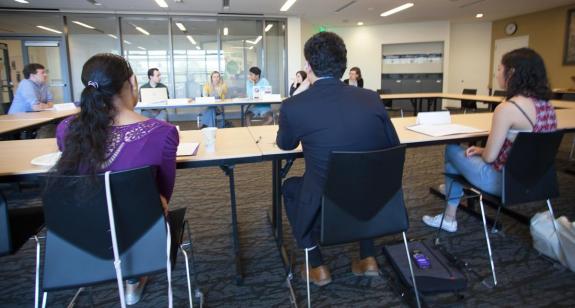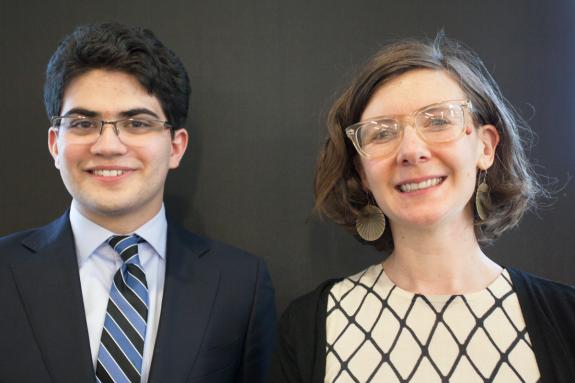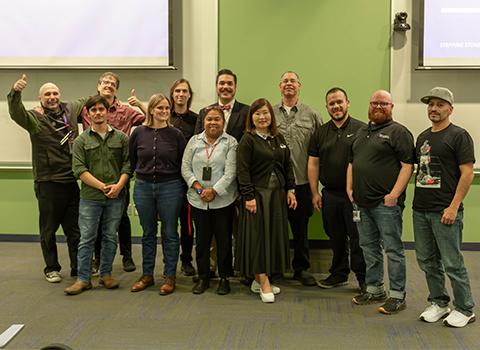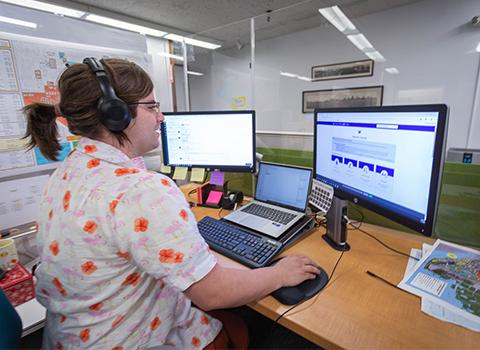Student U-PASS Advisory Board

Apply for the Board
Interested in applying to be a Student U-PASS Advisory Board member? Contact the ASUW Senate clerk or the GPSS secretary to get started.
This post was submitted by Cooper Smith, student U-PASS liaison for UW Transportation Services.
As the clock approaches five past two, a hush comes over the room.
“The public comment period is over. Let’s take a look at today’s agenda.”
Adam Khan, chair of the Student U-PASS Advisory Board, moves to discuss the first item, and the meeting begins.
The Advisory Board was formed in 2011 when the Student U-PASS Program became universal for eligible students, a decision reached by students to save the program from an endless cycle of rapidly increasing fees. A nine-member board of Associated Students of the University of Washington (ASUW) and Graduate and Professional Student Senate (GPSS) representatives, the Advisory Board provides a unique opportunity for UW students to participate in guiding the program and discussing the future of transportation in the region.
“It's so meaningful and exciting to say, ‘Hey, let's talk about X, or work on X project,’ and then have that item be on the agenda the next week,” says Hester Serebrin, vice chair of the Advisory Board. “It's really empowering to realize you can make a difference in students' transportation options on and around campus.”
Serebrin, who was recently appointed by Gov. Jay Inslee to the Washington State Transportation Commission, is someone deeply invested in local transportation policy. For her, joining the Advisory Board was an opportunity to think about important transportation questions in the context of her own studies.
“I'm studying transportation policy, both at school and in my job […] and I am particularly interested in how large institutions can help reduce their transportation footprint,” says Serebrin, who just graduated with a Master of Public Administration from the Evans School of Public Policy and Governance. “This seemed like a great way to be more involved in those decisions.”
For Khan, a senior majoring in international studies and political science, the Advisory Board has given him a similar opportunity to take lessons from the U-PASS program into his own backyard.
“Serving on the Advisory Board has enabled me to become active discussing transportation with administrators, students and citizens outside of campus,” he says. “I've been active in conversation with the local government where I live, where I have observed the absence of comparable programs like U-PASS. It has made me very appreciative of our universally leveraged fee that provides transportation at a lower cost per participant.”
Speaking with Khan and Serebrin, one gets a sense of one of the underrated strengths of the Student U-PASS program – the opportunity for students to have a voice. In the five years of its existence, the Advisory Board has passed several resolutions, ranging from support of expanding U-PASS to include more transit agencies, to negotiating a new fee and overseeing its implementation. The Advisory Board has allowed for an open dialogue on transportation issues between students and important campus stakeholders, including the ASUW Senate, GPSS, Office of Student Life, and members of the UW administration. In this way, the Advisory Board provides students an opportunity to shape the narrative about the University’s transportation present and future.
It also gives students a unique opportunity to develop leadership skills, experience working with policy and finance, and the chance to work with important movers and shakers around campus.
“We usually have really interesting policy discussions, mixed with important budget information and logistics,” says Serebrin. “It's great having Transportation Services staff on hand, because they have so much experience and so much institutional knowledge.”
Applications for serving on the Advisory Board go out each year during spring quarter, and all students, undergraduate (six representatives) and graduate (three representatives), are welcome to apply. If you are unsure if the Advisory Board is the right opportunity for you, consider this advice from Serebrin: “If you are at all interested in transportation policy, do it! Think big, be ready to learn, and come with questions and ideas for improvements. Transportation Services staff offers a lot of their time and effort, but if you are willing to put some time outside of meetings into things you are passionate about, you can accomplish a lot.”
Learn more about the Advisory Board and its history on the Transportation Services website.





